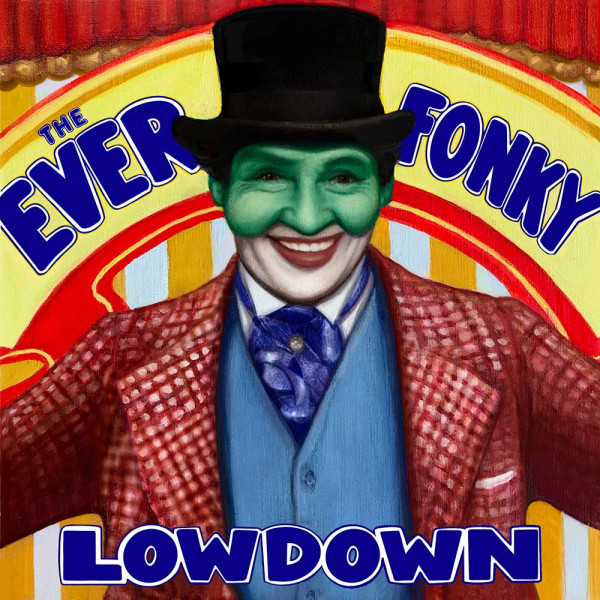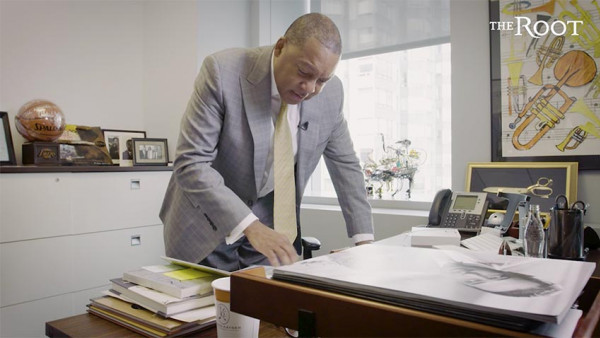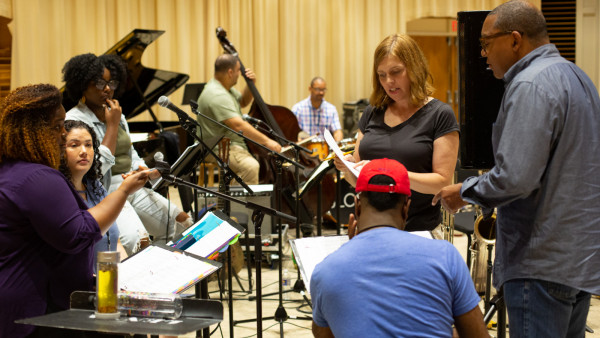The Ever Fonky Lowdown
“You really just want to be entertained,” says Mr. Game, the sly hustler-narrator played by acclaimed actor Wendell Pierce (The Wire, Treme, Jack Ryan) who presides over Wynton Marsalis’s new masterpiece The Ever Fonky Lowdown. Combining droll commentary with soulful, big band-backed vocals, the Lowdown is definitely entertaining—but it also brilliantly reveals Marsalis’s incisive, panoramic view of modern society.
Featuring the Jazz at Lincoln Center Orchestra and guest vocals from Camille Thurman, Ashley Pezzotti, Christie Dashiell, and Doug Wamble, the Lowdown is a funky jazz parable for 2020. It covers terrain from football to politics, from power to poverty, from love and romance to betrayal and corruption; it will make you dance and think. The Ever Fonky Lowdown is a horn-fueled survey of the political malaise and cultural decay now plaguing America—and how Marsalis suggests we might be able to rise above the structures that have been holding us back for centuries. (Download the libretto in PDF)

Album Info
| Ensemble | JLCO with Wynton Marsalis |
|---|---|
| Release Date | August 21st, 2020 |
| Recording Date | October 7-8, 2019 |
| Record Label | Blue Engine Records |
| Catalogue Number | BE0025 |
| Formats | Digital Download |
| Genre | Jazz at Lincoln Center Recordings |
| Digital Booklet | Download (pdf, 13 MB) |
Track Listing
| Track | Length | Preview |
|---|---|---|
| We Are the Greatest (Instrumental) | 0:36 | Play |
| Mr. Game Speaks: I Am a Winner | 3:55 | Play |
| We Are the Greatest | 1:34 | Play |
| Mr. Game: Success is My Middle Name | 1:00 | Play |
| They / Let’s Call Them This | 2:45 | Play |
| Mr. Game: Beware! They’re Going to Cause Problems | 0:45 | Play |
| The Ever Fonky Lowdown in 4 | 2:56 | Play |
| Mr. Game: Talk is a Waste of Time | 0:52 | Play |
| I Don’t Like Nobody but Myself | 2:14 | Play |
| Mr. Game: We Must Strike First! (Trust Me) | 1:37 | Play |
| The Drums of War | 2:28 | Play |
| Mr. Game: The Mandates of Our Democracy | 0:17 | Play |
| Consideration Blues / I Know I Must Fight / The Drums of War Return | 3:30 | Play |
| Mr. Game: Who is We? | 0:18 | Play |
| What Would the Savior Think? | 1:25 | Play |
| Mr. Game: Winners Don’t Reflect, We Celebrate | 1:17 | Play |
| Some for Me, None for You | 2:05 | Play |
| Mr. Game: We’re Number One! | 1:09 | Play |
| The Ever Fonky Lowdown in 5 | 2:59 | Play |
| Mr. Game: They Deserved Everything They Got | 2:09 | Play |
| Night Trader | 2:28 | Play |
| Mr. Game: They, Too, Want to Be Winners | 2:08 | Play |
| Mr. Good Time Man | 4:23 | Play |
| Mr. Game: Shame is for Losers | 0:52 | Play |
| Because I Want to, Because I Like to, Because I Can | 2:06 | Play |
| Mr. Game: a Ridiculous Plea | 0:07 | Play |
| I Wants My Ice Cream | 1:41 | Play |
| Mr. Game: Somebody’s Got to Rule | 0:05 | Play |
| The Ever Fonky Lowdown in 6 | 3:00 | Play |
| Reprise: What Would the Savior Think? | 0:38 | Play |
| The Ever Fonky Lowdown in 5 & 6 | 3:35 | Play |
| Mr. Game: Your First Prize | 2:39 | Play |
| Isms, Schisms | 2:30 | Play |
| Mr. Game: Your Second Prize | 3:29 | Play |
| Yes / No | 2:33 | Play |
| Where Has the Love Gone? | 1:05 | Play |
| Mr. Game: Your Third Prize | 3:29 | Play |
| Consider This ‘Bout the Filth We Love | 3:27 | Play |
| Mr. Game: Your Fourth Prize | 3:38 | Play |
| Everybody Wear They Mask | 2:56 | Play |
| Mr. Game: You Love These Prizes Because You Live Them | 0:12 | Play |
| The Ever Fonky Lowdown in 7 | 3:35 | Play |
| Mr. Game: Your Wildcard | 3:14 | Play |
| I Got a Nagging Feeling | 1:43 | Play |
| Mr. Game: The Freedom Fighter: Fannie Lou Hamer | 1:33 | Play |
| The Ballad of Fannie Lou: Part 1 | 3:29 | Play |
| The Ballad of Fannie Lou: Part 2 | 3:33 | Play |
| Mr. Game: Just Let the Memories of Them Die | 1:11 | Play |
| Why Do We Pick Slavery over Freedom? | 0:47 | Play |
| Mr. Game: Your Last Prize (The Best One) | 4:60 | Play |
| Reprise: The Ever Fonky Lowdown in 4 | 2:57 | Play |
| Reprise: I Wants My Ice Cream | 1:02 | Play |
| I Know I Must Fight | 1:05 | Play |
Liner Notes
I have always understood the genius of Wynton Marsalis in the full light of a particular genealogy of African American letters. I will leave it to others to describe his musical influences, but the way he thinks and talks about American culture and black folks’ central place in it bears the markings of writers like Ralph Ellison, Albert Murray, and Stanley Crouch. These complicated men offer searing commentary on the contradictions of American democracy, especially when it comes to race, but all hold an unshakable faith in its ideals—“with its image of hope, fraternity and self-realization,” as Ellison put it. For each of them, jazz embodies the spirit of this place, at once critique and aspiration, constraint and individuality. Theirs is not a naïve embrace, and they have shaped the voice and sound of Marsalis. One can hear echoes of them in the depth of Marsalis’s understanding of black vernacular culture when he talks about American life and how that becomes the raw stuff for his art. Listening to his vast body of work, you can grasp his sophisticated use of symbol and myth as he explores the sinewy features of American history and its beautiful and terrible underbelly. Marsalis composes and blows with his trumpet those insights with a mastery of craft and passion rarely seen. He has dedicated his life to this artform, and he has fought for its continued relevance to our national self-understanding, no matter who listens to the music.
The Ever Fonky Lowdown reveals some fundamental truths about the American project. Through the voice of the album’s narrator, Mr. Game—a character who is a slick combination of politician, hustler, and snake oil salesman who cajoles and evangelizes—Marsalis reveals that our ideal of democracy isn’t simply about individual freedom and liberty. With brutal and brilliant clarity, he shows us that these democratic virtues are tethered to an unrelenting pursuit of power, success, and money. These are the vices, along with an uncanny ability to sacralize hatreds, that have enabled some to rule the world. With cunning and charisma, Mr. Game offers the listener not only insight into the base values that undergird our way of life, but he tempts us with the golden apple—extending an invitation to those who would listen to be winners no matter the costs to their sentimental freedoms or to their general moral sense.
Mr. Game insists that we fulfill our obligation as members of this democracy by confronting honestly, and without the need of illusion, the hard reality of who we actually are. He does not speak on the lower frequencies to reveal the messiness and beauty of American democratic life (sentimentality is only a weapon in his hands); instead, he provides a kind of scandalous wisdom about how the whole game of American democracy works. It’s funky, and it is lowdown.
Ellison, Murray, and Crouch often invoked jazz as an apt metaphor for American democracy. A way of ordering chaos, the music illustrates the freedom evidenced in improvisation and in the consent to the ensemble necessary for its expression. In America, like jazz, there is a fierce individuality within community, but that community is shot through with evils that all too often cut short dreams and promises. With The Ever Fonky Lowdown, Marsalis uses jazz not to illustrate democratic virtues, but to disclose America’s dark underside. The irony of the artform that best illustrates democracy gives way to the bitter irony that the same music exposes the grand lie of the American ideology. Dream and buy into the promise of America and witness it all become a midden dumped at your feet.
Mr. Game offers an account of America rooted in power, leisure, and consumption that knows no boundaries and promotes itself as the greatest gift to humankind: America is the greatest show on earth, with its carnival barkers who keep our eyes on the so-called prize while the winners rob us blind. He reveals how Black folk have been caught up in it all: how the horrors of slavery shaped the country and how our sounds and musings have come to make this ghastly place swing. In Mr. Game’s hands, or Wynton Marsalis’s, jazz exposes the ugly truths of American life. He wants us to see it clearly, the Apostle Paul be damned.
As you listen to the music and take in what Mr. Game says, one cannot help but feel a sense of pervasive sadness here. (The sadness may very well be my own, and it colors the music and his words a deep shade of blue.) Marsalis has seen a lot over his many years. His, one might say, is an earned insight into this particular American calamity. He does not seem angry or bitter. He has been saying something like this for decades. But, if I am right about The Ever Fonky Lowdown, there is something different here: he seems resigned not so much to his fate, but to the fact that America is what it is. That we are who we are. And no matter what we say or how we fight—I love the glimmer of hope he offers with the example of Fannie Lou Hamer—the power of the idea of America continues to overrun everything.
Democracy requires something more of us than simply taking the bribe of the likes of Mr. Game. For it to work, we have to be capable of critical reflection and have a kind of moral sense that allows us to step outside of ourselves and recognize the worth and needs of our fellows as equal to our own. But, as Marsalis put the point to me, it may be more a question of, “Are we even up to democracy?” Understanding that possibility fully may very well be the ever funky lowdown! It certainly sent me to my liquor cabinet.
This jazz music has to be played in these times when America’s myths and legends crumble all around us. A generation has come of age amid calamity: 9/11, unending war, devastating hurricanes, mass shootings, economic collapse, and global pandemic. They do not need sweet stories or music that affirm the inherent goodness of this place or encourage them to stick their heads in the sand. They need truths, straight no chaser. Beauty can be found there. The Ever Fonky Lowdown is unvarnished truth, and it is beautiful music.
It may be the case that we are not up to what democracy demands. No matter. We must keep trying to live up to what genuine democracy requires of us. That struggle is worth it. In fact, the struggle itself might be the thing of ultimate value. I suspect that is why, in part, Marsalis keeps playing. “When we sit down to play,” he once told me, “we make [tangible our] belief.” He keeps playing, because he believes we can be otherwise. We keep fighting for the same reason even as Mr. Game tries to convince us to join his side.
Eddie S. Glaude
Princeton University
March 25, 2020
Credits
Recorded on October 7-8, 2019 at Jazz at Lincoln Center’s Agnes Varis and Karl Leichtman Studio. Additional recording on November 27, 2019 and March 14, 2020 at Sear Sound in New York, NY.
All compositions and libretto written by Wynton Marsalis (Skayne’s Music (ASCAP))
Executive Producer: Wynton Marsalis
Producer: Todd Whitelock
Recording Engineers: Todd Whitelock, Rob Macomber
ProTools Engineer and Editor: Gloria Kaba
Assistant Engineers: Teng Chen, Michael Hickey, Edwin Huett, Owen Mulholland (Sear Sound)
Mixing Engineer: Todd Whitelock at Amplified Art and Sound
Production Assistant: Wes Whitelock
Mastered by Mark Wilder at Battery Studios, NYC 2020
Label Head and A&R: Gabrielle Armand
Assistant Label Manager: Jake Cohen
Product Manager: Madeleine Cuddy
Marketing Manager: Nicole Morales
Product and Marketing Assistant: Benjamin Korman
Director of Public Relations and External Communications: Zooey T. Jones
Public Relations Manager: Madelyn Gardner
Legal: Daphnée Saget Woodley, Wesley Friedman, Allison Job
Vocal Coach: Damien Sneed
Music Administration: Kay Wolff, Christianna English
Audio Archivist: Ben Carbone
Music Copyists: Jonathan Kelly, Michael Sailors
Concert Programming: Jason Olaine, Georgina Javor
Concert Line Producer: Justin Bias
Booklet Design: Iris Dai
Album Cover and Booklet Paintings: Jessica Benjamin
Liner Notes: Eddie S. Glaude Jr.
Special thanks to Ian Kagey, PowerStation Berklee, David Gibson, and the Jazz at Lincoln Center production team.
Leadership support for Blue Engine Records is provided in part by the Arnhold Family and Jay Pritzker Foundation.
Major support for this project is provided by the Howard Gilman Foundation.
Generous support is provided by Helen and Robert Appel, Diana and Joseph DiMenna, Louise and Leonard Riggio, and Lisa Schiff.
The mission of Jazz at Lincoln Center is to entertain, enrich, and expand a global community for jazz through performance, education, and advocacy.
THE JAZZ AT LINCOLN CENTER ORCHESTRA WITH WYNTON MARSALIS
2019-20 CONCERT SEASON
REEDS
Sherman Irby – alto saxophone, clarinet, flute, and piccolo
Ted Nash – alto saxophone, clarinet, flute, and piccolo
Victor Goines – tenor and soprano saxophones, bass clarinet, and clarinet
(†) Walter Blanding – tenor saxophone
(*) Dan Block – tenor and soprano saxophones and clarinet
Paul Nedzela – baritone saxophone, bass clarinet, and clarinet
TRUMPETS
Ryan Kisor
Marcus Printup
Kenny Rampton
Wynton Marsalis
TROMBONES
Vincent Gardner – trombone and sousaphone
Chris Crenshaw — trombone and vocals
Elliot Mason
RHYTHM SECTION
Doug Wamble – guitar and vocals
Dan Nimmer – piano
Carlos Henriquez – bass
Jason Marsalis – drums and tambourine
SPECIAL GUESTS
Wendell Pierce – narrator
Camille Thurman – vocals
Ashley Pezzotti – vocals
Christie Dashiell – vocals
Bobby Allende – congas
Ricky “Dirty Red” Gordon – percussion
Additional performances from:
Sam Chess – trombone (track 7)
Adam Birnbaum – piano (tracks 7, 35, 42, 51)
Charles Goold – drums (track 35)
(†) Did not perform at this recording session
(*) substitute orchestra member
Solos list
7. The Ever Fonky Lowdown in 4
Ryan Kisor (trumpet)
15. What Would the Savior Think?:
Marcus Printup (trumpet)
17. Some for Me, Some for You:
Jason Marsalis (drums), Ryan Kisor (trumpet)
19. The Ever Fonky Lowdown in 5:
Dan Block (tenor saxophone)
21. Night Trader:
Doug Wamble (guitar), Ted Nash (alto saxophone), Wynton Marsalis (trumpet), Elliot Mason (trombone)
23. Mr. Good Time Man:
Victor Goines (clarinet), Wynton Marsalis (trumpet), Chris Crenshaw (trombone)
25. Because I Want to, Because I Like to, Because I Can: Doug Wamble (guitar and vocals), Marcus Printup (trumpet)
29. The Ever Fonky Lowdown in 6:
Dan Nimmer (piano)
31. The Ever Fonky Lowdown in 5 & 6:
Dan Block (soprano saxophone), Victor Goines (soprano saxophone), Vincent Gardner (trombone)
33. Isms, Schisms:
Victor Goines (clarinet), Ted Nash (piccolo)
35. Yes/No:
Ted Nash (alto saxophone), Chris Crenshaw (trombone)
40. Everybody Wear They Mask:
Vincent Gardner (trombone), Sherman Irby (alto saxophone), Victor Goines (clarinet), Wynton Marsalis (trumpet), Chris Crenshaw (trombone)
42. The Ever Fonky Lowdown in 7:
Wynton Marsalis (trumpet)
46. The Ballad of Fannie Lou: Part 1:
Doug Wamble (vocals and guitar)
47. The Ballad of Fannie Lou: Part 2:
Camille Thurman (vocals), Ashley Pezzotti (vocals), Christie Dashiell (vocals)
51. Reprise: The Ever Fonky Lowdown in 4:
Kenny Rampton (trumpet), Marcus Printup (trumpet), Chris Crenshaw (trombone), Ryan Kisor (trumpet)
Personnel
- Doug Wamble – banjo, guitar
- Dan Nimmer – piano
- Carlos Henriquez – bass
- Jason Marsalis – drums
- Ryan Kisor – trumpet
- Marcus Printup – trumpet
- Kenny Rampton – trumpet
- Elliot Mason – trombone
- Chris Crenshaw – trombone
- Vincent Gardner – trombone
- Victor Goines – tenor sax, soprano sax, clarinet, bass clarinet
- Ted Nash – alto sax, soprano sax, clarinet, flute, piccolo
- Sherman Irby – alto sax, soprano sax, clarinet, flute
- Dan Block – tenor sax, clarinet, bass clarinet
- Paul Nedzela – baritone sax, bass clarinet
- Camille Thurman – vocals
- Ashley Pezzotti – vocals
- Christie Dashiell – vocals
- Bobby Allende – percussion
- Ricky “Dirty Red” Gordon – percussion
- Sam Chess – trombone
- Adam Birnbaum – piano
- Charles Goold – drums
Also of Interest
-
 Videos
Videos
Wynton Marsalis Talks Race in America, Jazz and Keeping Music ‘Ever Fonky’ - The Root
-
 Photo Galleries
Photo Galleries
The JLCO with Wynton Marsalis performing “The Ever Fonky Lowdown” in Chautauqua, NY
-
 Photo Galleries
Photo Galleries
JLCO with Wynton Marsalis performing “The Ever Fonky Lowdown” in New York
-
 News
News
Wynton Marsalis on Jazz as a Tool for Understanding Life
-
 News
News
Take Note: Wynton Marsalis On The Intersection Of Jazz And Democracy
-
 News
News
Wynton Marsalis on Clear+Vivid Podcast with Alan Alda
-
 News
News
Wynton Marsalis On Democracy As Jazz And The Ever Fonky Lowdown
-
 News
News
Wynton Marsalis: how music makes a difference
